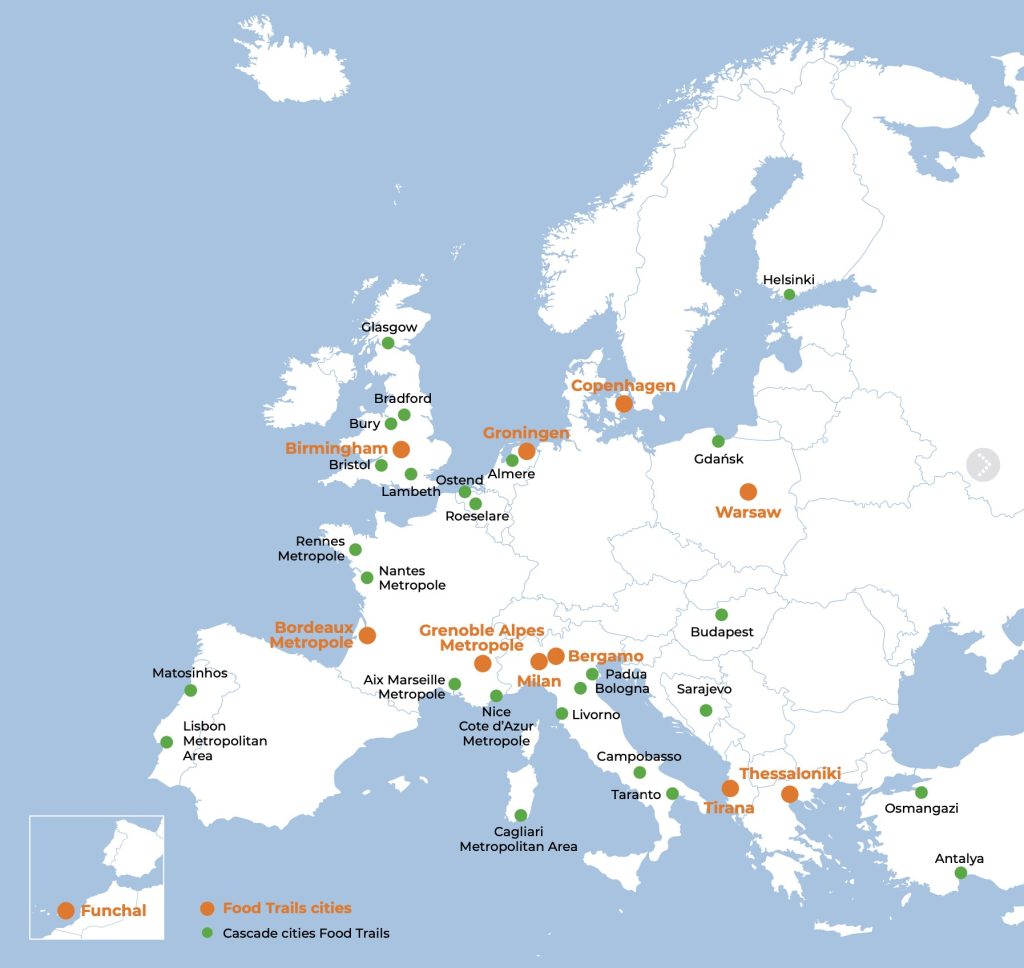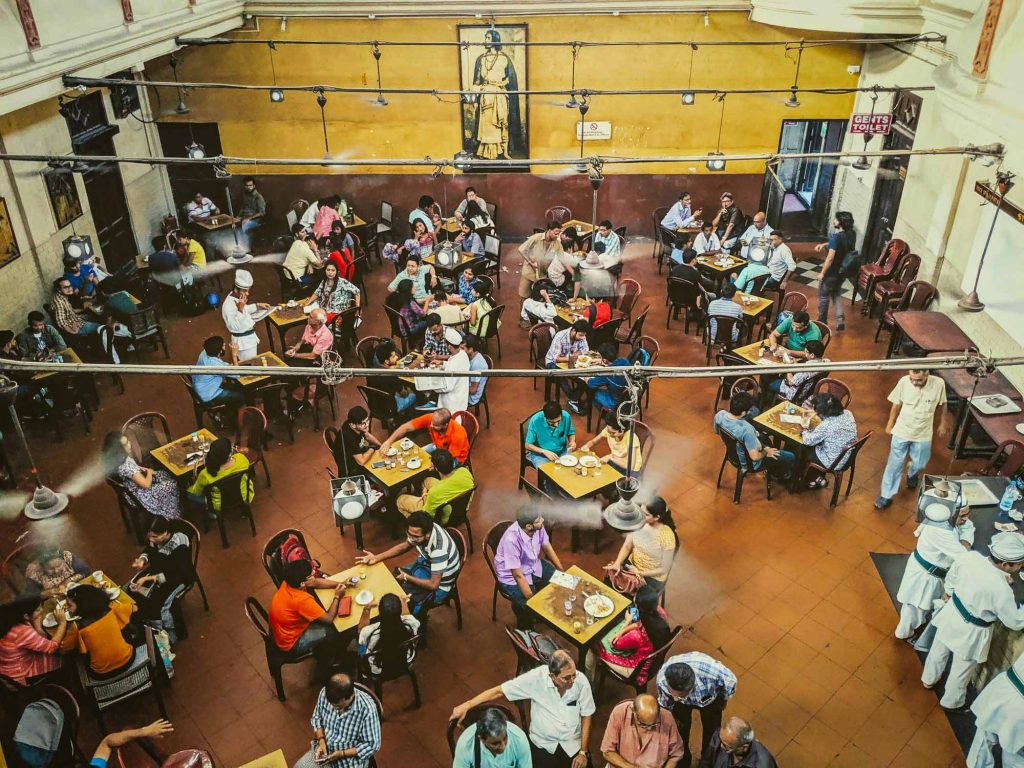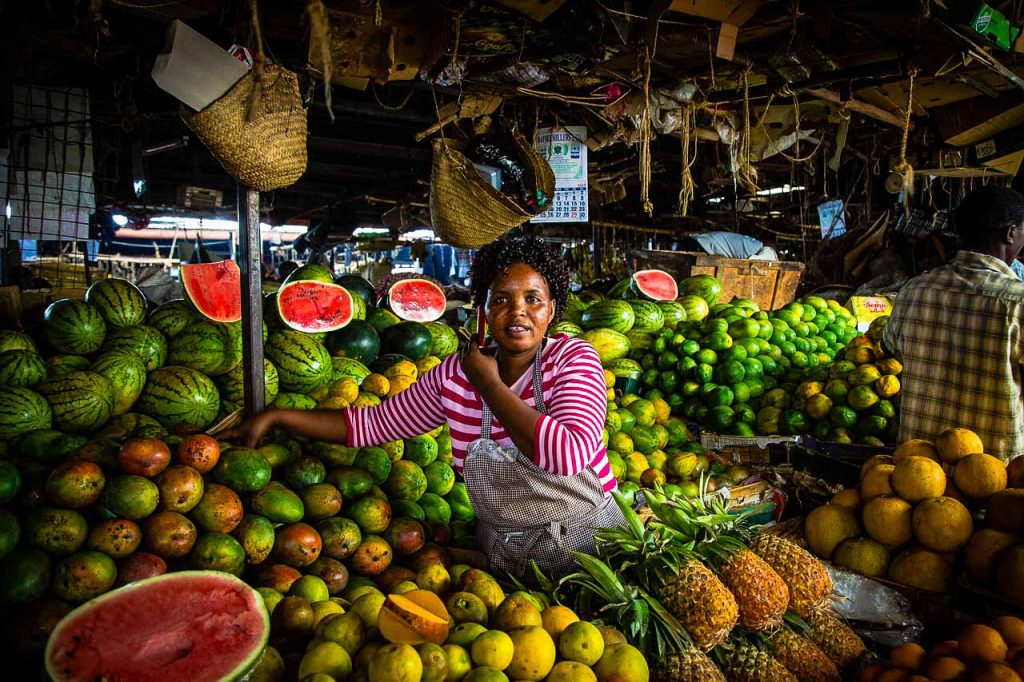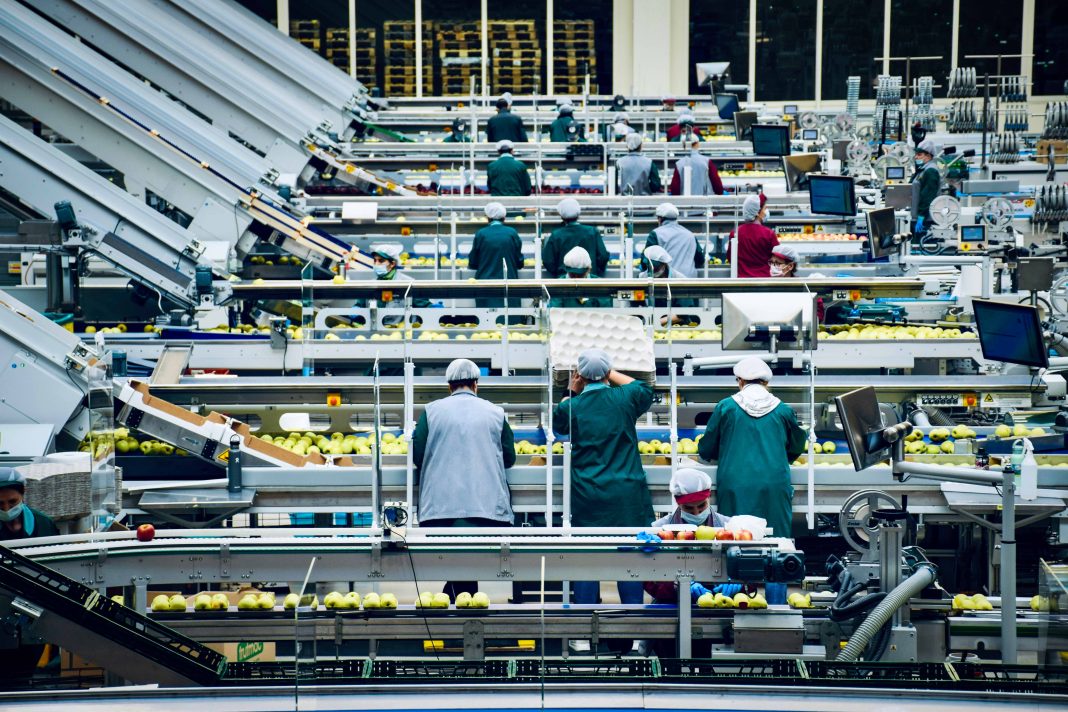This article was written for CityChangers.org by Siobhan Maderson, Food Trails Research Associate at Cardiff University, Wales. In it, she explains how the Food Trails project (of which Cardiff University is a partner) has tested new models and practices for urban food systems based on the Milan Urban Food Policy Pact and the Food 2030 Framework. While the project draws to a close in 2024, the ideas and tools tested in multiple European cities and outlined here offer a menu of sustainable food structures from which other urban centres can choose from and adapt to local conditions.
With global food systems associated with challenges to biodiversity, public health, climate change, and spatial socio-economic justice – and over 50% of the world’s population already living in cities and the percentage steadily increasing – it’s clear that just transitions towards sustainable urban food systems are a global priority.
In 2015, the Milan Urban Food Policy Pact (MUFPP) formalised commitment from over 150 cities around the world to review their city’s food systems. Since then, the MUFPP has nearly doubled its signatories, and developed a framework of recommended actions and interventions cities can use to improve their food systems.
While many cities have signed the pact and confirmed their commitment to urban food system reform, there are still challenges ahead in designing interventions, implementing the changes, and measuring impact.
The Food 2030 Framework supports research and innovation across four categories: climate and environment, circularity and resource efficiency, nutrition, and innovation and empowering communities.
These two frameworks can be used for cities to assess and transform their food systems, making them better for the environment, producers, and consumers. Furthermore, a recent Horizon 2020 project, Food Trails, has been working with 11 European cities, 3 universities, and other stakeholders to support cities at every step of these transitions. One of the key goals of the project is to inform and inspire other cities to make similar changes.

What Food Trails Cities Have Done
Food Trails cities committed to developing Living Labs to address their own local challenges that reflect recommended actions across the six MUFPP categories: governance, sustainable diets and nutrition, social and economic equity, food production, food supply and distribution, and food waste. These actions were also embedded within the Food 2030 framework.
Food Councils
For some of the cities, improving food system governance was a key goal. Bordeaux Metropole, France, and Thessaloniki, Greece, developed Food Councils. These brought together a wide range of stakeholders who shared a commitment to improving the regional food systems. Both found that getting colleagues involved from different city departments – waste, environment, education, public health, economic development, and more – was crucial, as was bringing in representatives from civil society, local businesses, and farmers.
Several cities note the importance of getting a food policy adopted, as this ensures that plans are resilient to any changes in local government. Well, setting up a Food Council is often the first step to establishing a food policy.
The cities also found that maintaining interest and enthusiasm can be a challenge. Stakeholders need to see some results from their involvement. Bordeaux Metropole have established working groups and action plans that address food waste, support local producers, and promote a food solidarity economy. Food justice – for producers and consumers – is at the heart of their work.
Food & Public Procurement
Copenhagen, Denmark, Milan, Italy, Grenoble Alpes Metropole, France, and Bergamo, Italy, all focused on their public procurement systems.
These cities use their purchasing power to support local, agroecological producers, and invest in training canteen staff to cook plant-based recipes.
Often, small-scale suppliers struggle to participate in public contracts. Developing technological support and adapting public tenders can facilitate the engagement of new participants.
These Food Trails cities are taking a broad, systemic approach to their work on procurement, recognising that the transport and buildings used in the public canteen network can also be places of innovation and municipal intervention. From state-of-the-art energy efficient buildings and vehicles to external paints that absorb atmospheric pollutants, cities are taking a holistic view of every step of the process in getting food from farms onto forks.
Support Where It’s Most Needed
Investing in staff training is also a key part of this process.
All too often, it is low paid workers who are expected to deliver interventions and monitor their impact, whilst receiving very little recognition. Cities have found that investing in training helps to develop skills and support for food system transformation.
While the work still tends to be low paid, there seems to be a stronger sense of buy-in from catering staff once their role is actively highlighted and valued by the municipality.
Furthermore, improving communication and clearly explaining the context for any recommended changes in menus, practices, etc. has helped canteen staff become more supportive of planned changes and interventions.
Then there’s cases like Groningen, Netherlands, which is developing its protein transition and working with local stakeholders to improve public health by producing a cookbook and providing cookery classes featuring easy, inexpensive, plant-based recipes.
Work on food in Birmingham, UK and Funchal, Portugal is also embedded in social initiatives, such as community and school holiday programmes for children from low-income families. By combining food system interventions with programmes that support people facing wider socioeconomic challenges, cities are more effectively addressing some of the root causes of food poverty, as well as promoting healthy dietary options.

Reducing Food Waste
Warsaw, Poland has been working with the HoReCa (hotels, restaurants, and catering) industry on cutting food waste. This is important, as much work on decreasing food waste focuses on individual consumers and households, although food waste takes place throughout the food chain.
The HoReCa industry can be particularly challenging to work with, and levels of food waste in this sector have been estimated to be up to a quarter of all food waste. Warsaw is working with the sector to improve its capacity to redistribute surplus, and provide biodegradable, non-plastic containers for customers to take home any uneaten portions of meals.
Tirana, Albania has one of the highest rates of poverty in Europe. This disproportionately impacts children and their ability to eat a nutritious meal, the consequences of which can be lifelong.
The city is providing healthy meals to all young children, as well as food for other vulnerable communities. It is also working to broaden the benefits of this approach by developing links with local agroecological food producers, so that interventions can provide economic benefit for them, as well as health and nutrition benefits for children.
Tools for Change
Food Trails has developed a series of tools to support cities in assessing their city’s food system and making changes.
The QSLR – QuickScan Lens for Replication – can be used by any city to assess the current state of their food system and recognise what needs to be done to make changes. Cities are encouraged to start by reviewing what policies are currently in place that relate to their food system. These will include different departments.
Cities also need to develop a clear vision and agenda of their ideal food scenario, and then get stakeholders to work together to design and carry out the activities that will bring this system into reality.
Each city was encouraged to develop a Food Policy Action Canvas to plan their work. This creates a clear overview of the planned intervention, detailing:
- who it will benefit
- who needs to be involved in delivering it
- what are the barriers and drivers supporting this work.
Measuring Impact
Cities often struggle to monitor the impact of their interventions. It needn’t be this way.
Food Trails cities used the MUFPP recommended actions and indicators to plan their work and assess its impact, including:
- increasing city residents’ access to urban agriculture gardens.
- increasing the number of local producers selling in public markets in the city.
- increasing the volume of surplus food recovered and redistributed for human consumption.
Cities also worked with researchers to help plan, deliver, and assess their Living Labs.
Peer learning is a central part of Food Trails. As well as working on their own challenges, each city also worked with other cities as knowledge-exchange pairs. Each city was mentor to one city, and was, in turn, mentee of another.
As well as the pairings within the main consortium, Food Trails ran a Cascade learning programme. As part of this, 26 cities from across Europe, and at different stages of their work on food system transformation, were put into ‘learning clusters’, with each cluster visiting one of the 11 cities.
Clusters were developed based on shared learning needs. Working with other cities who are facing similar challenges enabled cities to share experiences and see if these could support work in their own city. While every city has its own cultural, legal, and political framework that affects its food system, cities often adapted what they saw in different places to their own local context.
The peer learning program included online meetings as well as face to face visits. Mentors would take city representatives to see examples of best practices and innovations. The two-day visits were filled with insightful informal exchanges as well as workshops facilitated by Eurocities and researchers and proved to be both helpful and motivating for city officers.

The best practises observed during the visits include:
- Solidarity supermarkets where refugees could purchase affordable food as well as receive language lessons and social support.
- Wholesale markets which were working with third sector organisations to develop food surplus redistribution networks.
- Community gardens which made growing space available for individuals and communities on low incomes.
- Schools which incorporated food education into every stage of the curriculum.
- Public canteens which were developing plant-based menus.
- Community dining spaces where people could come together to eat a healthy meal, regardless of their income.
- Local farms which were producing food for public canteens; this guaranteed contract gave them the economic security to use agroecological methods that might make their food too expensive for the standard retail market.
- Municipally owned land that was available to people wanting to start new careers in food production; training, grants and practical support were also made available to them.
Food Trails is a four-year EU-funded Horizon 2020 project, bringing together a consortium of 19 European partners, including 11 cities, 3 universities and 5 organisations. The project aims to enable cities to reimagine, develop and implement sustainable, healthy and inclusive food policies.
For more information, please visit: https://foodtrails.milanurbanfoodpolicypact.org/

There are also opportunities for cities to join similar peer-learning programmes, such as the Cleverfood programme: apply by 27 September 2024.


